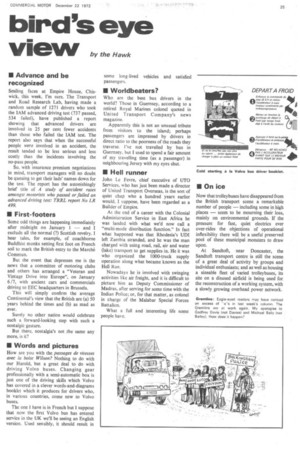bird's eye
Page 27

If you've noticed an error in this article please click here to report it so we can fix it.
view by the Hawk
• Advance and be recognized
Smiling faces at Empire House, Chiswick, this week, I'm sure. The Transport and Road Research Lab, having made a random sample of 1271 drivers who took the IAM advanced driving test (737 passed, 534 failed), have published a report showing that advanced drivers are involved in 25 per cent fewer accidents than those who failed the IAM test. The report also says that when the successful people were involved in an accident, the result tended to be less serious and less costly than the incidents involving the no-pass people.
So. with insurance premium negotiations in mind, transport managers will no doubt be queuing to get their lads' names down for the test. The report has the astonishingly brief title of A study of accident rates amongst motorists who passed or failed an advanced driving test: TRRL report No LR 499.
• First-footers
Some odd things are happening immediately after midnight on January 1 — and I exclude all the normal (?) Scottish revelry. I hear tales, for example, of coachborne Buddhist monks setting first foot on French soil to mark the British entry to the Marche Commun.
But the event that depresses me is the news that a committee of motoring clubs and others has arranged a "Veteran and Vintage Drive into Europe", on January 6/7, with ancient cars and commercials driving to EEC headquarters in Brussels.
This will simply confirm the average Continental's view that the British are (a) 50 years behind the times and (b) as mad as ever.
Surely no other nation would celebrate such a forward-looking step with such a nostalgic gesture.
But there, nostalgia's not .the same any more, is it?
• Words and pictures
How are you with the passages de vitesses avec la boite Wilson? Nothing to do with our Harold, but a great deal to do with driving Volvo buses. Changing gear professionally with a semi-automatic box is just one of the driving skills which Volvo has covered in a clever words-and-diagrams booklet which it produces for drivers who, in various countries, come new to Volvo buses.
The one I have is in French but I suppose that now the first Volvo bus has entered service in the UK we'll be seeing an English version. Used sensibly, it should result in some long-lived vehicles and satisfied passengers.
• Worldbeaters?
Who are the best bus drivers in the world? Those in Guernsey, according to a retired Royal Marines colonel quoted in United Transport Company's news magazine.
Apparently this is not an unusual tribute from visitors to the island; perhaps passengers are impressed by drivers in direct ratio to the poorness of the roads they traverse. I've not travelled by bus in Guernsey, but I used to spend a fair amount of my travelling time (as a passenger) in neighbouring Jersey with my eyes shut.
• Hell runner
John Le Fevre, chief executive of UTO Services, who has just been made a director of United Transport Overseas, is the sort of quiet chap who a hundred years earlier would, I suppose, have been regarded as a Builder of Empire.
At the end of a career with the Colonial Administration Service in East Africa he was landed with what we'd now call a "multi-mode distribution function." In fact what happened was that Rhodesia's UDI left Zambia stranded, and he was the man charged with using road, rail, air and water (lake) transport to get supplies in. He it was who organized the 1000-truck supply operation along what became known as the Hell Run.
Nowadays he is involved with swinging activities like air freight, and it is difficult to picture him as Deputy Commissioner of Madras, after serving for some time with the Indian Police; or, for that matter, as colonel in charge of the Malabar Special Forces Battalion.
What a full and interesting life some people have.
• On ice
Now that trolleybuses have disappeared from the British transport scene a remarkable number of people — including some in high places — seem to he mourning their loss, mainly on environmental grounds. If the pressure for fast, quiet electrics ever over-rides the objections of operational inflexibility there will be a useful preserved pool of these municipal monsters to draw upon.
At Sandtoft, near Doncaster, the Sandtoft transport centre is still the scene of a great deal of activity by groups and individual enthusiasts; and as well as housing a sizeable fleet of varied trolleybuses, its site on a disused airfield is being used for the reconstruction of a working system, with a slowly growing overhead power network.












































































